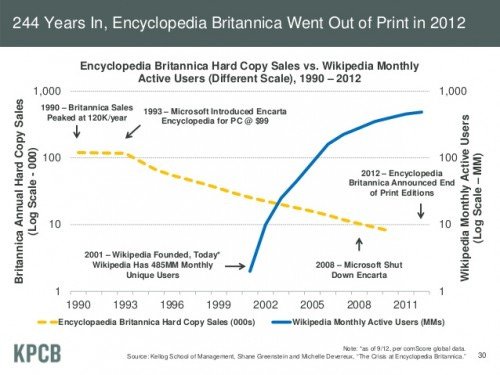Wikipedia Didn't Kill Britannica—It Saved the Encyclopedia
Mary Meeker is a venture capitalist associated with the famous Silicon Valley VC firm Kleiner Perkins who is—as Wikipedia describes her—“primarily associated with the Internet". Indeed, her annual "Internet Trends" report is highly anticipated in the Valley. Her 2012 report is no different, and it includes a couple of slides focused on Wikipedia vs. Britannica (see also: "Regarding the Uncertain Future of Encyclopædia Britannica”, March 14, 2012). Here's the important one:

My first reaction, as I tweeted last week, was to be fairly unimpressed:
Via @kpcb and @galleycat, this chart of Wikipedia's growth vs. Britannica's sales looks pretty much like you'd expect: bit.ly/YORMeX
— The Wikipedian (@thewikipedian) December 6, 2012
But looking at it again, it's quite obvious that for all the discussion of Wikipedia "killing" Britannica, this is not the case at all. First of all, as Wired's Tim Carmody correctly observed earlier this year, Britannica's sales began to falter with the introduction of Microsoft Encarta in 1993. If Meeker's numbers are accurate, then the debut of Wikipedia in 2001 had no impact whatsoever on Britannica's declining fortunes. Nor does Britannica's downward slope appear to have accelerated with the rapid adoption of the Internet from the late 1990s onward. The y-axis of Meeker's chart, if anything, downplays Wikipedia's ubiquity compared to Britannica's sales. Being logarithmic scales charting different numbers, truth be told, I think it's kind of a terrible chart, but it's still readily apparent that Wikipedia is vastly more accessible to readers than Britannica ever was. Anecdotal evidence obviously supports this: I'll bet anything you look at Wikipedia more now than you ever did Britannica, and there are millions who never had access to Britannica before, but can read Wikipedia now. One thing I would have liked to see here is Britannica.com's online traffic; writing as one who was in college during the late 1990s and used Britannica.com when it was a free resource, I'd imagine its true relevance nosedived when the site erected a paywall sometime around the year 2000, not that this would necessarily influence print sales. The bottom line is clear: Britannica's failure and Wikipedia's triumph have nothing to do with one another, apart from the inexorable migration of information from analog to digital, and from physical to cloud-based storage. And here is the vastly more interesting trend question: what will eventually replace that? For the full Meeker report, click here.


